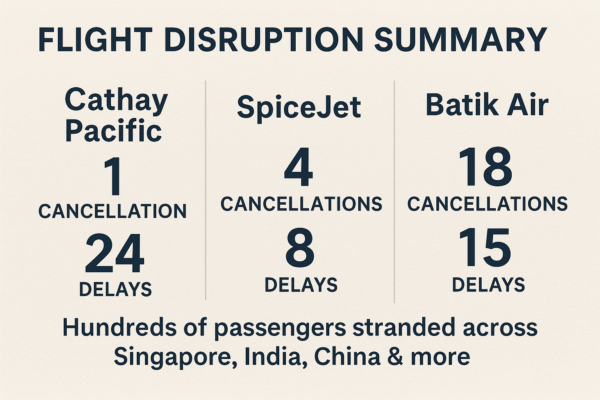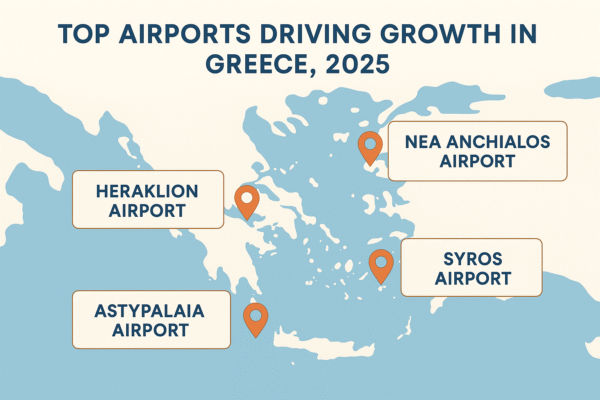Travelers across Asia are facing unprecedented disruptions after Cathay Pacific, SpiceJet, and Batik Air canceled and delayed dozens of flights, leaving hundreds of passengers stranded at major airports in Singapore, South Korea, Malaysia, Thailand, India, and China. The wave of cancellations, driven by a combination of adverse weather, operational problems, and technical challenges, has thrown holidaymakers and business travelers into disarray.
Scale of the Disruption
According to reports, a total of 23 cancellations and 47 delays have been recorded across the three airlines in the past several days. The hardest hit has been Batik Air, which recorded 18 cancellations and 15 delays, mainly affecting domestic Indonesian routes and regional connections. SpiceJet experienced 4 cancellations and 8 delays on routes within India, while Cathay Pacific reported 1 cancellation but nearly two dozen delays on high-traffic flights connecting Hong Kong with China and Southeast Asia.
The cancellations have caused ripple effects at some of the busiest airports in Asia, including Singapore Changi, Hong Kong International, Delhi Indira Gandhi, Kuala Lumpur International, Bangkok Suvarnabhumi, and Shanghai Pudong. Many passengers are stuck waiting for alternative routes or refunds, creating scenes of frustration and overcrowding at airline service counters.
Cathay Pacific: Hong Kong and Regional Routes Impacted
Cathay Pacific, headquartered in Hong Kong, is grappling with delays that have disrupted hundreds of passengers on business and leisure trips. Key cancellations included flights between Kuala Lumpur, Shanghai, Bangkok, and Xiamen.
- CPA724 (Kuala Lumpur to Hong Kong)
- CPA978 (Hong Kong to Xiamen)
- CPA617 (Hong Kong to Bangkok)
- CPA361 (Shanghai to Hong Kong)
Though only a handful of flights were officially canceled, the 24 reported delays have strained Hong Kong International Airport, one of Asia’s busiest hubs. Travelers have complained of long queues, missed connections, and confusion over rebooking options. Cathay Pacific has advised passengers to check flight status updates regularly and has pledged compensation in line with international aviation standards.
SpiceJet: Indian Domestic Travelers Hit Hard
India’s low-cost carrier SpiceJet has also struggled, citing operational challenges and adverse weather across northern India. The disruptions have particularly affected business routes and pilgrimage destinations.
Key cancellations include:
- SEJ719 (Mumbai to Kolkata)
- SEJ717 (Ahmedabad to Varanasi)
- SEJ715 (Mumbai to Varanasi)
Travelers reported last-minute cancellations that forced them to seek costly alternatives on other carriers. Domestic business travelers and holidaymakers visiting Varanasi and Kolkata were among the worst affected. SpiceJet has offered rebooking on available flights or full refunds, but availability remains limited, especially during peak travel periods.
Batik Air: Indonesian Routes Disrupted
The heaviest wave of cancellations came from Batik Air, part of Indonesia’s Lion Air Group. The airline reported 18 cancellations across Jakarta, Surabaya, Makassar, Yogyakarta, and Palembang, citing technical and weather issues.
Key cancellations included:
- BTK6235 (Bubung to Makassar)
- BTK7059 (Jakarta Halim to Palembang)
- BTK7518 (Surabaya to Jakarta Soekarno-Hatta)
These cancellations caused severe disruption for Indonesian domestic travelers, with many unable to attend business meetings, family events, or onward international connections. The affected airports, especially Jakarta Soekarno-Hatta and Surabaya Juanda, experienced significant overcrowding as stranded passengers scrambled for alternatives.
Tourist and Passenger Impact
The cancellations have not only disrupted regional business travel but also affected international tourists connecting through Asia’s busiest hubs.
- Singapore: As a major transfer point for Southeast Asia, Changi Airport has seen crowded terminals and frustrated passengers.
- South Korea: Incheon International faced ripple effects as rerouted flights caused congestion.
- Malaysia & Thailand: Kuala Lumpur and Bangkok recorded heavy disruptions as Cathay Pacific and Batik Air adjusted schedules.
- India: Domestic passengers in Mumbai, Delhi, and Ahmedabad were forced to pay higher fares on rival carriers after SpiceJet cancellations.
- China: Shanghai and Beijing airports experienced delays and cancellations linked to Cathay Pacific’s regional operations.
Many tourists, particularly those on multi-country itineraries, have faced missed tours, hotel bookings, and connecting flights. For some, the uncertainty has extended trips by several days.
Airlines’ Response and Passenger Advice
All three airlines have issued statements urging passengers to monitor official websites and apps for updates. Customer service teams are working around the clock, but limited staff and high passenger volumes are causing long wait times.
Affected passengers are being offered:
- Rebooking on later flights when available
- Accommodation vouchers for extended overnight delays
- Full refunds for canceled services
Airlines have also promised to strengthen operations in the coming weeks to restore confidence. However, aviation experts warn that weather disruptions and ongoing staffing shortages could lead to continued irregularities.
What’s Next for Travelers?
For now, passengers are advised to:
- Check flight status frequently via official airline channels.
- Arrive early at airports to allow for possible re-routing.
- Keep travel insurance handy, especially for international trips.
- Stay flexible with itineraries, as regional weather remains unpredictable.
Travelers across Asia are bracing for further turbulence, but airlines are under mounting pressure to minimize disruptions ahead of the holiday season.
Conclusion
The widespread disruptions across Cathay Pacific, SpiceJet, and Batik Air highlight the fragile state of post-pandemic aviation in Asia, where a mix of weather, technical issues, and operational limits continue to challenge airlines.
With 23 cancellations and 47 delays recorded across six countries, the incident has left hundreds of passengers stranded and countless others scrambling for alternative routes. While airlines have pledged refunds and rebookings, the scale of inconvenience underscores the need for travellers to remain vigilant, flexible, and insured.
As the aviation industry works to stabilize, passengers are reminded that real-time updates and early planning are the best tools for navigating Asia’s skies during turbulent times.
For more travel news like this, keep reading Global Travel Wire













